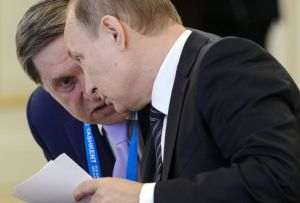Joseph Stiglitz, laureat al Premiului Nobel, a criticat, încă o dată, politicile de austeritate impuse Greciei de către Germania şi Zona Euro, spunând că "Germania este responsabilă pentru haos".
Într-un interviu pentru ziarul Tagesspiegel, citat în presa grecească, Stiglitz estimează că problemele financiare ale Greciei nu au fost rezolvate după înţelegerea asupra celui de-al treilea bail-out.
"Problema a fost transferată în viitor. Trebuie să aşteptăm să vedem ce se va întâmpla după alegeri, dacă va fi o coaliţie care să distrugă sistemul oligarhilor. Troika nu a ajutat prea mult, deocamdată, în această direcţie", a subliniat economistul american.
Potrivit lui Stiglitz, Grecia are nevoie de o reducere a datoriei: "Fondul Monetar Internaţional a spus clar că Grecia nu îşi poate plăti datoria şi că are nevoie de un haircut".
Economistul a mai spus că dacă obiectivele setate de troika nu sunt revizuite, atunci "recesiunea în Grecia va fi mai mare".
Printre ţintele care trebuie schimbate este surplusul de 3,5%, pe care Grecia trebuie să îl atingă în 2018.
"Ceea ce ucide Grecia nu este numai o lipsă de eficienţă în sectorul public şi privat. Când sistemul bancar din Grecia este atât de distrus, nu poate face prea multe pentru întreprinderile mici şi mijlocii, iar Grecia este o ţară a companiilor mici şi mijlocii. Trebuie să găsim o cale să restartăm finanţarea acestora", a mai spus economistul.
Stiglitz a concluzonat că politica de austeritate pronovată de Germania este una "periculoasă".
Formaţiunea de extremă-stânga Syriza, condusă de Alexis Tsipras, a câştigat alegerile pentru a doua oară în ultimele opt luni, cu un procent surprinzător.
În pofida unei prezenţe la vot de numai 56,5% (comparativ cu 63% în alegerile din ianuarie), grecii i-au acordat lui Tsipras a doua şansă, deşi premierul a semnat, în august, un nou acord de împrumut cu creditorii internaţionali, ca să evite intrarea în incapacitate de plată şi ieşirea din zona euro. Tsipras şi-a anunţat demisia în luna august, forţând astfel organizarea alegerilor anticipate.
Viitorul guvern al Greciei trebuie să adopte în următoarele săptămâni o serie de măsuri legislative pentru recapitalizarea urgentă a băncilor.

























































1. fără titlu
(mesaj trimis de anonim în data de 24.09.2015, 07:01)
poti sa fii laureat Nobel si sa bati campii.
problemele Greciei n-au fost rezolvate , ci transferate in viitor, si de asta tot Germania va fi vinovata !!!
si la noi tot asa :vinovati sunt ALTII
2. Syriza nu este extremă stânga
(mesaj trimis de Cristi C în data de 24.09.2015, 10:19)
Degeaba în răcesc gura de pomană. Nu se prea prinde ceva de Bursa.
Chiar și BBC-ul a înțeles până la urmă. Deși în urmă cu un an, tot scria "radical left".
În 2012, BBC Îi numea "far left" (ceea ce și erau atunci).
Pe 21 sep 2015, BBC scria că este doar "left-wing", adică de stânga. "Greece's Alexis Tsipras has said his left-wing Syriza party has a "clear mandate" after winning a second general election in less than nine months."
În feb 2015, BBC scria "So what are the aims of a party that was once a wide-ranging far-left coalition that included Maoists"
După toate aceste detalii, este oare colectivul redacțional Bursa în stare să înțeleagă diferența dintre "radical left", "far left" sau doar "left-wing"?
2.1. fără titlu (răspuns la opinia nr. 2)
(mesaj trimis de anonim în data de 24.09.2015, 10:21)
Bursa este de extrema dreapta.
2.2. fără titlu (răspuns la opinia nr. 2)
(mesaj trimis de anonim în data de 24.09.2015, 14:01)
Coaliția Stângii Radicale (în greacă: Συνασ πισμό ς Ριζοσ παστι κής Αριστ εράς, Synaspismos Rizospastikís Aristerás), cunoscut mai ales prin acronimul SYRIZA (în greacă: ΣΥΡΙΖ Α, pronunțat [siɾiza]), este un partid politic de stânga din Grecia, fondat inițial în anul 2004 ca o coaliție de stânga. Este cel mai mare partid din parlamentul elen, președintele partidului Alexis Tsipras fiind prim-ministru al Greciei.
Coaliția a cuprins inițial o gamă largă de grupuri (13 în total) și politicieni independenți, inclusiv social-democrați, socialiști democratici, patrioți de stânga, grupări feministe și de stânga verzi, precum și grupuri maoiste, troțkiste, Eurocomuniste.
Daca stie cineva o ideologie la stanga comunistilor, atunci intradevar Syriza nu este de extrema stanga.
2.3. fără titlu (răspuns la opinia nr. 2.2)
(mesaj trimis de Cristi C în data de 24.09.2015, 15:17)
Exact. "a cuprins inițial". Foarte bine punctat. Acum pricepi? Acea Syriza pestriță de acum 10 ani nu mai este cea de azi (care este un partid, nu coaliție).
2.4. Pentru cei neinformati (răspuns la opinia nr. 2.2)
(mesaj trimis de Syriza în data de 24.09.2015, 15:38)
SYRIZA (Coalition of the Radical Left) entered a new stage in its life and action as a single party after its first (Founding) Congress (10-14 July 2013).
There were 3,568 Congress delegates, who had been elected by 491 organisations of members in Greece, Greeks abroad and youth groups. The Congress elected Alexis Tsipras as President of the party, as well as a 201-member Central Committee. Some of the component organisations of the initial coalition did not agree with the transformation of SYRIZA into a single party and retain their relationship to SYRIZA as allied groups (Active Citizens, led by M Glezos, Democratic Social Movement - DIKKI, DEA, KEDA).
2.5. Syriza is not the only left-wing party in Greece (răspuns la opinia nr. 2.4)
(mesaj trimis de anonim în data de 24.09.2015, 15:48)
The prospect of a Syriza victory in Sunday’s Greek election is big news, and the international left has taken notice. The attention is welcomed, but Alexis Tsipras’ electoral prowess has obscured what the real political landscape in the country is like.
After all, Syriza is not the only left-wing party in Greece, and by some measures it’s not even the largest. In organizational terms, the Communist Party of Greece (KKE) is bigger. Ignoring it, as most of the Left is content to do, means ignoring a force with important roots in the trade union movement and the longest history of all surviving Greek parties.
Communist Party representatives hold ten out of the forty-five seats on the board of Greece’s labor confederation, and in the last student union elections in 2014, its lists received 18.5 percent of the vote. Those affiliated with Syriza got only 6.5 percent.
What’s more, many of the labor struggles of the last years cannot be understood without KKE participation, and in some cases — like that of the nine-month steel worker strike in Athens — it was KKE unionists who led the struggle. Even in electoral terms, the Communist Party had the largest share of votes on the Left from the fall of the dictatorship in 1974 until Syriza’s rise in May 2012.
Proof of the general pull to the left that Greece has experienced in recent years, in the elections of May 2012, the KKE not only avoided being squeezed by Syriza’s success, but had its best performance in twenty years (8.5 percent). But things changed immediately after, in the June elections. The party won only 4.5 percent, its worst result in the modern era.
The KKE’s rhetoric is clearly to Syriza’s left. Its programs declare that capitalism cannot be reformed, and that we shouldn’t have illusions of transforming European Union institutions. In a recent speech, Dimitris Koutsoumbas, the party’s general secretary said:
KKE serves one goal: for the working class to take power so that we can live better days, with prosperity for the people. The proposals of KKE lead to this goal and follow this criterion. Not on the basis of how much the economy can take. Because this is a capitalist economy, which — under whichever management or government — produces crises, unemployment, and poverty.
This anti-capitalist discourse makes the Communist Party an easy target for those who label it a “political fossil” engaging in an out-of-touch ultra-leftism. Some — including members of its small internal opposition — attribute its recent electoral failures to this radical discourse.